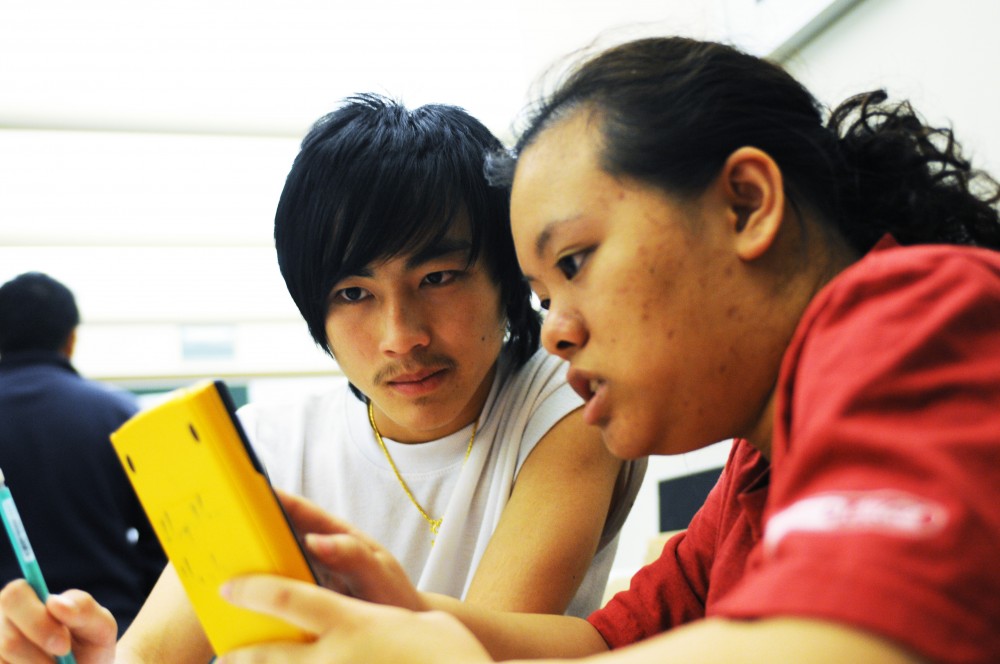Being able to read and comprehend her social studies homework is only a small part of the reason 10th-grader Kao Vang wants to learn English faster. A Hmong refugee from Thailand, Vang and 15,000 others like her arrived in the United States beginning in 2004, 5,000 of them making a home in Minnesota, and 1,000 in Hennepin County. Learning English not only means doing better on homework, but helping her parents, who do not speak English, Vang said. Vang received help with English and homework Sunday evening by taking part in the Hmong tutoring program provided by the Hmong Minnesota Student Association student group and the UniversityâÄôs Center for Urban & Regional Affairs. The 20 junior high and high school students involved in the program live in north Minneapolis but attend the Hopkins School District. They faced violence and bullying while attending schools in north Minneapolis as well as segregation from mainstream English speaking classes, said Jay Clark, the tutoring programs organizer with CURA. When administration told them they would have to continue going to classes taught mostly in Hmong, some students banded together and transferred to the Hopkins district through the âÄúChoice Is YoursâÄù program, which allows low-income Minneapolis students to enroll in neighboring suburban school districts, Clark said. Clark said 55 Hmong students ranging from kindergarten through 12th grade now attend Hopkins schools, but many found school to be more difficult when they got there. âÄúThe classes are in English, which in the long-term is really great,âÄù he said, âÄúbut, in the short-term is very hard.âÄù After the Hmong students he worked with approached him, Clark said he decided to go to HMSA to find homework help and role models for the students. The program ran in beginning stages last spring, but kicked off its first full year at the end of September. More than 40 HMSA University students signed up to serve as tutors for the program, which will run Sunday evenings at CURA through June. Jahia Vue , a biology sophomore, said she signed up because she wants to break the barrier that often exists between Hmong Americans, who were born in the United States, and Hmong Thai students, who are refugees. âÄúWhen I went to school the Hmong American students didnâÄôt talk to the Hmong Thai students,âÄù she said. Physics and sociology sixth-year Tien Dang said when he came to the United States he didnâÄôt know much English and wished there had been a program like this for him, which is his reason for tutoring. âÄúI didnâÄôt really have a good experience at school,âÄù he said. âÄúItâÄôs tough when you donâÄôt know a lot of English and you have to do your homework.âÄù After hearing about the program through friends who attend the University, Cheng Vang, an international business junior at Metropolitan State University, said he is tutoring to show this new generation of Hmong immigrants that their interest in education can pay off. âÄúItâÄôs about teaching another person what you know and encouraging them,âÄù he said. âÄúYou can teach them that other people have gone through it and their hard work can become something.âÄù Many of the students in attendance Sunday brought social studies homework âÄî the subject they said is the hardest to understand. Hue Yang , a ninth grader, said the words used in social studies books are difficult. âÄúThe teacher talks a lot in social studies and we cannot catch the words,âÄù he said. Yang said he likes working with the University students because they can practice English with them and they can see what itâÄôs like to be a college student. Yia Yang, community program specialist with the Center for Urban & Regional Affairs, said the students may be new to the country, but they are eager to learn. âÄúHopefully, given a few more years, they will be going to school [at the University],âÄù he said. In coming years, Clark said he wants to open the program to more students, but first some transportation issues will have to be resolved. Getting the students to campus now requires that they âÄústuff them in tiny Toyotas and Hondas,âÄù Clark said. Clark said he ultimately hopes the University will allow the program to use University vans to pick up the students, much like the America Reads program uses vans to transport tutors to students. The more students the program can expose to the University, the better, Clark said. âÄúWe hope the students think they could be sitting here in the same seats as the Hmong students who are here today,âÄù he said.

Image by Tony Morimoto
hmong on hmong
Hmong tutor program provides students with an alternative
Published October 6, 2008
0

